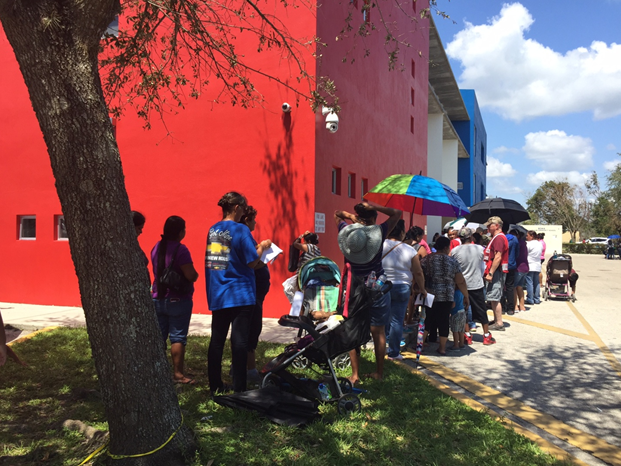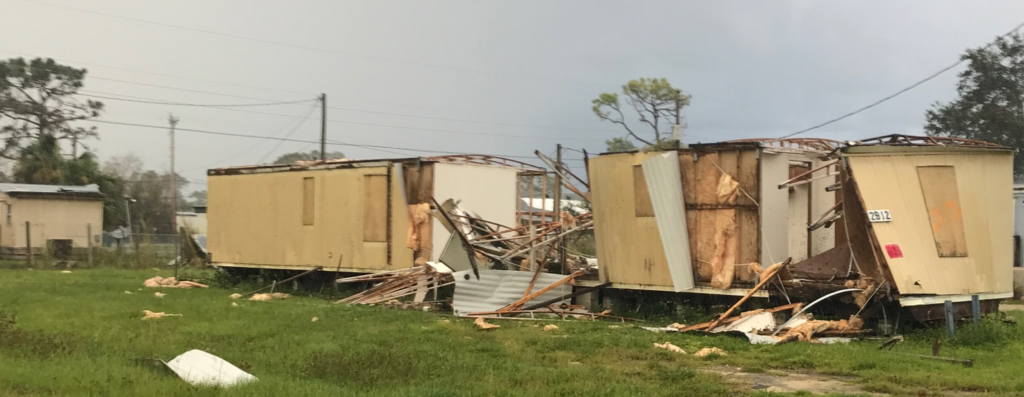
Juana Brown describes scenes that unfolded the storm-ravaged farming community of Immokalee, Fla.
A woman pleaded for help as she stood in a long line with her eight-day old baby after Hurricane Irma devastated the small town, 50 miles inland from Naples.
“I don’t have work,” the woman said. “I am ready to go back to work.”
Originally from Guatemala, she had been working in the fields when she went into labor days before Irma struck. The storm destroyed the trailer where she lived with her seven-year-old daughter, who is visually impaired. She waited for hours in the blazing sun with more than 700 other displaced residents. Many had lost their homes and sought federal emergency aid.
Brown is the director of charter schools for the Redlands Christian Migrant Association. It runs the Immokalee Community School, a charter school devoted to migrant families, where many storm victims turned for help.
A teacher began collecting diapers. School officials collected water to distribute to residents. Other staff members signed up as community volunteers. The school has helped feed more than 800 people in one day in the storm’s aftermath. With the help of other community organizations and staff from U.S. Sen. Marco Rubio’s office, it’s helping residents apply for FEMA assistance.
In short, the Immokalee Community School has joined other organizations to help this farming community of just more than 24,000 recover from the storm.
“This is part of RCMA’s mission,” Brown said. “We talk about opening doors of opportunity for the community. We have very intentionally located ourselves in communities. The organization was founded by Mennonites. What they saw as they came into the community is it was not about us doing for them. It was about making sure the community is part of the work we do. We are part of the community where we are located. Each of these communities are our communities.”
RCMA mostly serves children in rural poverty, and the majority are children of Hispanic immigrants. It has three charter schools and 71 learning centers in 21 Florida counties.
At least 38 percent of Immokalee residents are migrants. Many are undocumented. That complicates their efforts to get help after the storm.
The woman Brown described did not have a social security number, which is required for FEMA assistance. The woman’s daughter is a U.S. citizen. But rounding up the necessary paperwork proved difficult in a community with limited gas and electricity. Even under ideal conditions, many residents rely on bicycles for transportation.
But people at the school did not want to leave the woman without aid.
After much searching, and with help from Rubio’s office, they found the paperwork to get the woman’s daughter signed up for Medicaid.
Widespread devastation

Hurricane Irma passed directly over Immokalee, which sits on the western edge of the Everglades in eastern Collier County.
According to the U.S. Census Bureau, 43.9 percent of Immokalee residents live in poverty. Many live in mobile homes, which were devastated by the storm.
Brown met a woman who lived in a trailer with five daughters. Part of her roof was torn off. She asked Brown simply for a tarp to cover her roof. At night, the woman would take her youngest daughters to her car to get air conditioning. The water line also broke. Brown said she tried to tell her it was simply not safe to live there anymore, but the woman felt she could not leave.
“If I leave my home, I will lose everything I have in there,” Brown says the woman told her. “People are breaking in and trying to take everything.”
Brown said many Immokalee residents in similar situations do not want to seek help. Some undocumented immigrants might be wary of dealing with the government. Others take pride in self-sufficiency. They simply want tools that will allow them to solve problems on their own — like a tarp to cover the roof.
“For our community, it has been especially difficult,” Brown said. “It is already a community in need. A community that struggles to make a living, where people live day-to-day, not month-to-month.”
Most residents do not have cars, which makes it increasingly difficult to gather supplies. Some roads are still impassable by bus. Irma did untold damage to Florida crops. Brown said that could leave many farmworkers, including many parents her school serves, out of work.
“It is just a hard life — a life so characterized by hardship that has only been compounded by a tragedy that is going to take months and months to get the community back on its feet,” she said.
Jaime Weisinger is the community relations director for Lipman Family Farms, a major tomato producer with a farm in Immokalee. He said the local tomato harvest, a lynchpin of the local economy, could shrink to as little as a sixth of its usual size.
“All the supporting industries that rely on farms for their revenues, it is going to have a ripple effect,” he said. “It is going to have a ripple effect, from the restaurants to the people eating out. We have yet to see the worst of it.”
As it helps the community cope with its losses, the Immokalee Community School also has its own storm damage to worry about. Water got into some of the classrooms on the first floor, Brown said. Trees surrounding the school are gone.
Like other public schools in Collier County, the charter school remains closed until Monday.
One community for all
Beatriz Drago has taught at Immokalee Community School for the past three years.
When the storm hit, she surveyed the surrounding town, visiting mobile homes and checking on neighbors.
She came across a woman who was sitting outside her mobile home. It was botched on one side, and the other half was falling in. Her dog was trapped inside. Drago said she climbed in a little opening in the home and found the dog cowering under the fridge. She helped it out of the trailer and returned it to its owner.
Since then, she’s signed up to volunteer at Lipman Family Farms, which helped distribute supplies to residents.
“I have been going everywhere, so I feel that I am helping my school and that I am helping everyone in Immokalee,” she said.
She also is working with the community to start a local disaster relief organization. She said she is inspired by the resilience of the residents.
“The spirit hasn’t died,” she said. “These families come from other countries. They know how to cook outside. If they live 10 miles away from one place getting help, they can’t walk there every day.”
Weisinger said Lipman Farms coordinated with a crisis response team, God’s Pit Crew, to help bring water, ice and cleaning supplies to 3,000 families.
Organizations did not have to ask for volunteers, he added. They just showed up.
“We were in the middle of the distribution and I had this guy in a minivan drive up and say, ‘I collected this stuff from my church. Can you use it?’ That happened on more than one occasion.”
The need for help, however, could last longer than the initial surge of assistance.
“There will still be people affected by this when the cameras go away and when the power comes back on,” Weisinger said.
Challenges ahead
On top of the economic toll, many residents are now without shelter. While one shelter has opened up in Immokalee, school officials worry it will not be able to house everyone.
“Where is the help?” Brown asked. “You are living in substandard housing. You need a roof to be able to deal with water damage.”
Drago said residents are helping each other. Some have taken in neighbors whose homes were destroyed, even though space in their trailers is already cramped.
Brown said she is not sure how many will ultimately receive FEMA assistance. Some families could be turned away because, like the mother she met in line less than a week after the storm, they did not have social security numbers.
“There is a lot of controversy about people and farm workers,” she said. “Are they undocumented? We forget that every time we sit at the table, we have to give thanks to the people who picked those crops and processed those crops.”


